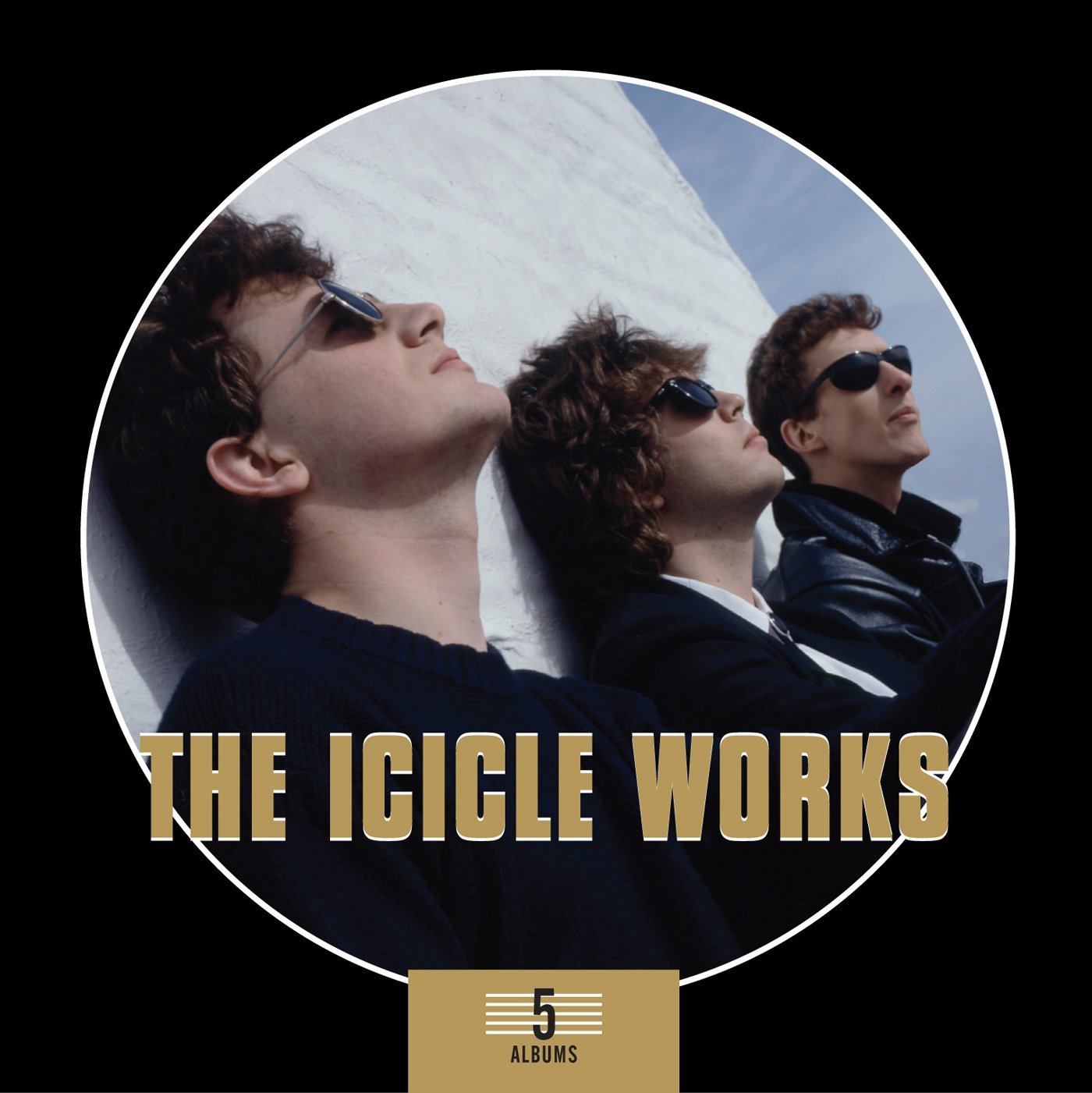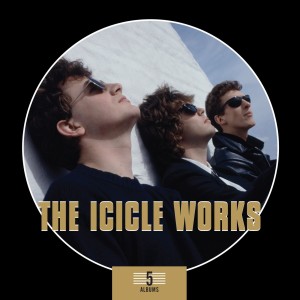Most retrospectives of the Icicle Works‘ career tend to focus on the fact that they never had the commercial success and critical acclaim that their eclectic music so richly deserved. However, settling down to listen to this 5 album box set, what’s best remembered is how revered they were as a live act, the quality of the songwriting and the great careers enjoyed by both Ian McNabb and drummer Chris Sharrock, who went on to become the drummer of choice for World Party, The La’s, Robbie Williams and Oasis among others. Back in the Stalinist music environment of the mid-80’s there were two types of success: Huge commercial success on the one hand and Cover-of-the NME-alternative-hipster success as enjoyed at the time by The Smiths or The Jesus and Mary Chain. The Icicle Works never fitted into either of these categories in a time when image was all and Ian McNabb was always too intelligent and well-adjusted to speak in quotable soundbites like Morrissey or his friend Ian McCulloch. In many ways, The Icies are better suited to today’s brave new egalitarian musical world that judges most music with an equally disinterested ear, and in which they are still worth a listen.
It’s no coincidence that their eponymous debut album was the point where the Icicle Works most closely coincided with the music-buying public. A homogenous batch of sharp, post-punk songs with strong choruses, referencing elements of psychedelia and synth-pop. The lyrics evocatively capture an ancient, story-telling vibe of “Telling tales beside some burning wood” and girls with eyes as “dark as November when it falls on our village”. Occasionally youthful metaphors are endearingly strained such as “I love you like a factory in the desert” or “As the Dragonfly flies”; and playing live all of this bucolic imagery was exacerbated by the presence of swirling leaves; like Morrissey and his gladioli, perhaps a response to the prevailing synthetic culture of the time.
As an attempt to consolidate their commercial success, the follow-up album ‘The Small price of a bycicle’ is a strange beast. Listening now, I can hear elements of what I now recognise as prog-rock, world music, 70’s rock, folk, motown and even jazz. The lyrics are still literate but more grandiose if anything, and it’s not difficult to see why the average consumer of Madonna or The Pet Shop Boys found this work challenging. The bonus single ‘When it all comes down’, included here, references Jack Kerouac and has a musical sweep that is typical of this period of the band’s work. The ‘Hollow horse’ and ‘Seven horses’ singles still sound anthemic and muscular, anticipating the Britpop sound that was still ten years away, but sounding like nobody else did in 1985. ‘Rapids’ has not aged well and now sounds a bit ponderous, McNabb’s goth-tinged baritone struggling to do justice to the lyrical ambition and jazzy piano. In his entertaining and scabrous memoir, McNabb describes the troubled recording of the album with producers who wanted a more commercial and coherent sound, and this pressure is evident throughout. It’s on the album’s extras, outtakes and b-sides section that the band seem to loosen up and are freed of the constant pressure to commercialise, such as on the marvellously loose and limber ‘Slingshot‘.
Drafting in fellow Liverpool lad, Indie rock producer supreme and future Lightning Seed: Ian Broudie to produce the follow-up to the ‘Bycicle’ album seemed a good move on paper, and is vindicated on several tracks of ‘If you want to defeat your enemy sing his song’. Stand-out track ‘Understanding Jane’ has aged particularly well, sounding like a fresh and energetic Beatley melody played at breakneck speed with one of the Sex Pistols’ guitars. ‘Evangeline’ is another of McNabb’s ‘story-telling’ songs, referencing a kind of homespun Americana wisdom with images of bayous and the deep south. Again, it’s all a world away from Morrissey‘s northern kitchen sink melodrama or Madonna‘s Material World and it just didn’t fit any kind of attempts at classification. The album’s incongruous attempts at out and out synth pop clash with the uncharacteristic earnestness that breaks through on ‘Up here in the north of England’; chronicling a bleak 1980’s Liverpool blighted by heroin and unemployment, and mocking the Tories’ solution to these tragedies of organising the 1984 International Garden Festival.
By the time of the ‘Blind’ album, you can hear the sound of McNabb’s Crazy Horse-period solo career straining to escape from the band format, with Sharrock and Layhe sounding more and more like beleaguered session men struggling to realise his vision. They have one last ill-advised stab at commercial success – with the horrible attempt to capture the then-current INXS white funk-rock style that is the ‘Kiss off’ single, but their hearts just don’t sound in it. In fact the band would break up prior to the release of this album. This is effectively their ‘Abbey Road’: some great playing and songs but just a sense of something being not quite right behind the scenes.
A live album recorded at the Town and Country club in 1986 makes up the last of the quintet. It’s included over the last Icicle Works album that McNabb recorded without Layhe and Sharrock for Epic – presumably for contractual reasons. Although it’s a passable record of the band’s live abilities, like most live albums it has neither the polish of the studio recordings or the excitement of being at the gig, and feels like it’s there to fill space.
Selling incredibly cheaply, it’s not hard to see why so many copies of this box-set have been sold in the time since its release. For those like me who would walk over hot coals to see the original line-up play one last Christmas show at the Liverpool Royal Court it’s been a genuine treasure to rediscover these songs, while the uninitiated will be able to dip into it at very little expense. Disturbingly, Ian McNabb has complained on his Facebook feed that he’s getting nothing financially from this release, which is an indictment of both many dodgy contracts signed back in those days and of the current slog many life-long musicians have to earn a crust. One just hopes he benefits from any revival of interest indirectly. All in all, the Icicle Works 5 Album box set contains some great songs and is also a snapshot of the music industry at a time when it had the resources to take talented musicians and try to re-mould them in order to market them as a commodity. We might surmise the industry got what it deserved even if the musicians didn’t.





